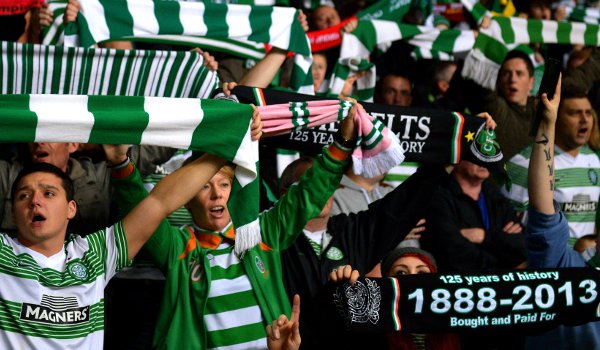THE violent events that transpired before and after the Ajax games in both Glasgow and Amsterdam continue to be discussed and written about in Scotland.
It is now clear that a sectarian element was among the Ajax support. In Glasgow they sang “F*** the Pope” while sporting Rangers scarves.
Those supporters caused over £20,000 worth of damage to Celtic Park and their club have been charged that amount by UEFA.
We are now all too familiar with the violent events that occurred in the return leg, innocent fans being attacked by a mob as they left hotels is one of many horror stories associated with one of the darkest experiences supporters have endured.
Five Celtic fans have been found guilty of using violence against Dutch police in Amsterdam. Those fans have denied the charges and are currently free during the two-week period in which they can appeal.
As previously mentioned here, the way the story has been reported in Scotland has failed to put it into context as well as failing to focus on the provocation caused by both Ajax fans and the police.
Celtic supporters are fed up of being misrepresented. Isn’t it time the media shifted the focus from the unpalatable behaviour of a small minority and gave a better platform to the majority of Celtic supporters?
It’s worth looking at a story from earlier this year to understand the difficult relationship between Celtic supporters, the police and the Scottish government.
Many Celtic fans’ beliefs and behaviour is being neutered by the Offensive Behaviour Act (2012). This has been a contentious political happening that has alienated many football supporters.
In March, supporters organised a peaceful protest around the Gallowgate. Despite the nature of the event images of Celtic supporters being brought down violently and kettling tactics being employed by the police were posted on various Celtic websites.
In this context, how will Celtic supporters vote on the Scottish independence referendum next year? Are they likely to endorse the elevation of the country’s establishment?
Perhaps the Scottish first minister should have made some comment on recent events in Amsterdam — after all, he’s got ground to make up.
The Green Brigade have made their feelings about the SNP clear and they have an influence on many potential voters who currently feel alienated by the government.
Neil Lennon commended the Green Brigade for their support after wrapping up the league title in April. During that same game the fan organisation unfurled, not for the first time, an anti-SNP banner.
Alex Salmond’s comments during the Rangers tax case were another massive own goal. He misjudged the feelings of Celtic supporters when he said: “Celtic can’t prosper unless Rangers are there.”
Those words encouraged an immediate response from the club who underlined Celtic’s priority was Celtic, not the “fortunes” of any other club.
 Celtic supporters are tired of being misrepresented
Celtic supporters are tired of being misrepresentedSalmond also described Rangers as “part of the fabric of the Scottish nation”. This encouraged one Daily Record columnist to ask: “And Celtic are what exactly?”
Many Celtic supporters have traditionally felt uncomfortable with aspects of Scottish Nationalism. As well as having a Scottish identity, being part of an Irish Diaspora is equally as valid or sometimes more important.
That means feeling connected to other Irish communities be it Liverpool, Belfast or New York.
The idea of separation means a significant detachment from Irish communities in Britain as well as a weakened position in Scottish society which has traditionally had a problem with Irish culture and it’s associations with Celtic supporters.
While players and those working at the club come and go, the unique identity of an Irish Catholic politically aware support endures.
The most recent example of the community feeling a sense of inequality was how the media reported events in Amsterdam.
Like it or not being Irish and Catholic in Scotland is still a problem for many not from that tradition, particularly in times of aggressive secularism.
Des Dillon, writer of Singing I’m No A Billy He’s A Tim, has suggested wearing a Celtic top in Scotland is a statement: it’s “declaring a lot of things: a Catholic morality, whether you’ve got it or not because that’s the root, you’re declaring tribalism, anti-racism and you are declaring that you are not completely locked into this country, your own town and your local team.”
Dillon’s point is one that remains particularly valid during the build-up to the referendum, in that for many Celtic fans, their state of mind transcends Scottish life and affairs.
Many supporters carry a sense of idealism and responsibility in supporting Celtic that might not fit into a Scottish Nationalist agenda. The Offensive Behaviour Act has proved that.
The politics of many Celtic supporters is about issues around the world as much as in Scotland.
Glaswegian Thomas Rannachan recently ran as a single issue candidate in the Govan by-election. He stood against the Offensive Behaviour Act, showing articulate opposition while providing an essential voice for many Celtic supporters.
He explained why he got involved: “In my current role, helping those aged 16-24 into work, I’ve encountered a lot of people who have been charged under this law. It makes it much harder for them to move forward.
“Football fans and those wishing to express their culture and heritage should not be persecuted by people who should be protecting them.”
Alex Salmond would do well to consider that culture and heritage sometime soon. At the very least; let’s open the door to a debate?
Richard Purden is the author of We Are Celtic Supporters and Faithful Through and Through

